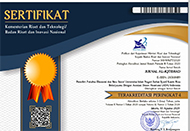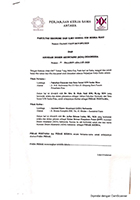THE PERCEPTION OF THE KIAI'S VIOLATED TOWARDS DIGITALIZATION OF ECONOMIC TRANSACTIONS
Abstract
This paper aims to describe the Kiai's perception of violating the digitalization of economic transactions, which is limited to four areas, namely m-banking, e-money, e-wallet and financial technology. The research method used is qualitative using primary data sources from the field, where the research subjects are the offending Kiai who meet the criteria. Data was collected using interview and observation techniques. Data validity uses triangulation, member checking and emic methods. After coding, the data was analyzed using domain and taxonomy analysis techniques. The results that can be presented are the Kiai violating perceptions of the digitization of economic transactions divided into two, namely first the violating Kiai who are exposed to stimulus and direct experience of digitizing economic transactions at high intensity; and secondly, the Kiai violates with a low level of exposure and direct experience. Kiai violates the first category perceiving the digitization of economic transactions in the aspects of function and shariah compliance, in which the digitization of economic transactions is perceived as a transaction medium which is easy, practical, safe, efficient, comfortable, supports activities and does not conflict with sharia aspects. The Kiai violating the second category perceives the digitalization of economic transactions as merely a non-cash financial transaction. This research is expected to complement the theory of perception formation by adding a confirmation stage in the perception formation process. In addition, research also limits the applicability of the theory of agent of social change, meaning that kiai can act as agents of social change if they have the ability to adapt to the dynamics of civilization.
Keywords
Full Text:
PDFReferences
Achiria, S. & Abidin, M. S. (2015). Dampak Kebijakan E-Money Di Indonesia Sebagai Alat Sistem Pembayaran Baru. Jurnal Akuntansi UNESA, 3(2), 1–21.
Adnan, M. (2018). Tasawuf Kiai Kampung. Yayasan Paddhang Bulan.
Anwar, H.M., M. (2013). Modernisasi Pesantren: Pergeseran Tradisi Dan Pudarnya Kyai. 10(1).
Arner, D. W., Barberis, J. N., & Buckley, R. P. (2015). The Evolution of Fintech: A New Post-Crisis Paradigm?
Aulia, S. (2020). Pola Perilaku Konsumen Digital Dalam Memanfaatkan Aplikasi Dompet Digital. Jurnal Komunikasi, 12(2), 311–324.
Baharun, H., & Ardillah, R. (2019). Virtual Account Santri: Ikhtiyar Pesantren Dalam Memberikan Layanan Prima Berorientasi Customer Satisfaction Di Pondok Pesantren. ISLAMICONOMIC: Jurnal Ekonomi Islam, 10(1).
Barnes, D. F. (1978). Charisma and religious leadership: An historical analysis. Journal for the Scientific Study of Religion, 1–18.
Creswell, J. W. (2014). Creswell, Qualitative Inquiry and Research Design. SAGE.
Danuri, M. (2019). Perkembangan dan transformasi teknologi digital. Jurnal Ilmiah Infokam, 15(2).
Dhofier, Z. (2011). Tradisi Pesantren: Studi Tentang Pandangan Hidup Kyai. LP3ES.
Fatimah, S., & Suib, M. S. (2019). Transformasi Sistem Pembayaran Pesantren Melalui E-Money Di Era Digital (Studi Pondok Pesantren Nurul Jadid). Jurnal Ekonomi Dan Bisnis, 20(2), 96–108.
Fauzi, A. (2020). Kebijakan E-money di Indonesia Perspektif Maqasid al Shari ‘ah fi al Amwal [PhD Thesis]. UIN Sunan Ampel Surabaya.
Fitriyani, F. (2021). Persfektif Ulama Banjarmasin Mengenai Penggunaan Dompet Digital [PhD Thesis]. Universitas Islam Kalimantan MAB.
Gaffar, A. (2021). Kiprah Pembelajaran Kiai Langghar di Madura. FIKROTUNA, 13(01).
Geertz, C. (1981). Abangan, Santri, Priyayi dalam Masyarakat Jawa. Pustaka Jaya.
Handi Irawan. (2012, July 12). The uniqueness of indonesian consumer. The Uniqueness of Indonesian Consumer. http://www.handiirawan.com/articles/the_uniqueness_of_indonesian_consumer/karak-ter_dan_perilaku_khas_konsumen_indonesia.html
Hastriana, A. Z. (2017). Pandangan Kiai Madura Terhadap Pembayaran Non Tunai. ’Anil Islam: Jurnal Kebudayaan Dan Ilmu Keislaman, 10(1), 86–115.
HH. (2022, July 22). Wawancara Pribadi [Personal communication].
Horikoshi, H. (1987). Kyai dan Perubahan Sosial. LP3ES.
Howard, J. A., & Sheth, J. N. (1986). Consumer Behavior and Marketing Strategy. Mc Graw Hill.
Irmawati, D. (2011). Pemanfaatan e-commerce dalam dunia bisnis. Jurnal Ilmiah Orasi Bisnis–ISSN, 2085(1375), 161–171.
Iswanto, A. (2020). Kiai Sebagai Patron dan Sponsor Praktik Multiliterasi di Pesantren Pada Era Media Digital. EDUKASI: Jurnal Penelitian Pendidikan Agama Dan Keagamaan, 18(3), 287–301.
Izzah, I. Y. U. (2011). Perubahan pola hubungan kiai dan santri pada masyarakat muslim tradisional pedesaan. The Sociology of Islam, 1(2).
Kottler, et. al., P. (2009). Manajemen Pemasaran. Indeks.
Leksono, S. (2013). Penelitian Kualitatif Ilmu Ekonomi dari Metodologi ke Metode. Jakarta: Rajawali Pers.
Mappiare, A. (1994). Psikologi Orang Dewasa Bagi Penyesuaian dan Pendidikan. Usana Offsetprinting.
Marlina, L., Mundzir, A., & Pratama, H. (2020). Cashless Dan Cardless Sebagai Perilaku Transaksi Di Era Digital: Suatu Tinjauan Teoretis Dan Empiris. Jurnal Co Management, 3(2), 533–542.
Ma’shum, AM. M. H. (2016). Kiai Langgar dan Bank Syariah: Studi terhadap Persepsi dan Preferensi Kiai Langgar terhadap Bank Syariah. IAIN Pekalongan.
Ma’shum, AM. M. H. (2017). Persepsi dan Perilaku Kiai Pesisir terhadap Bank Syariah. Disertasi, UIN Sunan Kalijaga.
Masnun, M. (2019). Krisis Karisma Kiai di Tengah Modernitas. Jurnal Pendidikan Islam, 9(1), 25–32.
MN. (2022, July 21). Wawancara M. Nasir [Personal communication].
MT. (2022, July 11). Wawancara pribadi [Personal communication].
Muamar, A., Samsudin, S., & Fitriyah, L. (2020). Dompet Elektronik Dalam Transaksi Pelanggan Ovo Menurut Perspektif Maqa> Ṣid Syarī’ah. Al-Mustashfa: Jurnal Penelitian Hukum Ekonomi Syariah, 5(1), 92–105.
Mundiri, A., & Nawiro, I. (2019). Ortodoksi dan Heterodoksi Nilai-nilai di Pesantren: Studi Kasus Pada Perubahan Perilaku Santri di Era Teknologi Digital. Jurnal Tatsqif, 17(1), 1–18.
NF. (2022, June 29). Wawancara pribadi [Personal communication].
NS. (2022, June). Wawancara [Personal communication].
NZ. (2022, June 4). Wawancara pribadi [Personal communication].
Otara, A. (2011). Perception: A Guide for Managers and Leaders. Journal of Management and Strategy, 2(3). https://doi.org/doi: 10.5430/jms.v2n3p21.
Piliang, Y. A. (2012). Masyarakat informasi dan digital: Teknologi informasi dan perubahan sosial. Jurnal Sosioteknologi, 11(27), 143–155.
Poespowardojo, S. (1989). Strategi Kebudayaan Suatu Pengantar Filosofis. Gramedia.
Poloma, M. M. (1994). Sosiologi Kontemporer. Raja Grafindo Persada.
Putra, A. D. (2020). Rancang Bangun Aplikasi E-Commerce Untuk Usaha Penjualan Helm. Jurnal Informatika Dan Rekayasa Perangkat Lunak, 1(1), 17–24.
Pye, L. W. (1965). Aspect of Political Development. Little Brown.
Rif’ah, S. (2019). Fenomena Cashless Society Di Era Milenial Dalam Perspektif Islam. Al-Musthofa: Journal of Sharia Economics, 2(1), 1–14.
RU. (2022, Mei). Wawancara Pribadi [Personal communication].
Saputro, M. E. (2011). Muslim localizing democracy: A non-pesantren village in Madura as a preliminary study. Indonesian Journal of Islam and Muslim Societies, 1(2), 297–316.
Simamora, B. (2008). Panduan Riset Perilaku Konsumen. Gramedia Pustaka Utama.
SQ. (2022, June 14). Wawancara pribadi [Personal communication].
Sugiana, D. (2018). Ulama And Financial Information Needs Of Rural Community: Study In West Java, Indonesia. Jurnal Pengabdian Kepada Masyarakat, 2(8), 714–717.
Sugiana, D., Mirawati, I., & Trulline, P. (2020). Credibility Of Rural Ulama In Dealing With Hoaks. European Journal of Molecular & Clinical Medicine, 7(1), 3636–3644.
Susanto, E. (2007). Krisis Kepemimpinan Kiai: Studi atas Kharisma Kiai dalam Masyarakat. ISLAMICA: Jurnal Studi Keislaman, 1(2), 111–120.
Syafiqurrahman, S., & Hosnan, M. (2019). Kepemimpinan Kiai:(Analisis Modalitas Kepemimpinan Kiai Kampung Dalam Tradisi Kompolan). Tafhim Al-’Ilmi, 10(2), 17–41.
Turmudi, E. (2004). Perselingkuhan Kiai dengan Kekuasaan. LKiS.
Vernon L. Allen & Evert van de Vliert. ( 2001). A Role Theoretical Perspective on Transitional Processes. In Role Transitions: Explorations and Explanations. Plenum Pers.
WULANDARI, M. (2019). Tinjauan Hukum Islam Tentang Biaya Pengisian Saldo Uang Elektronik (E-Money)(Studi Pada Bank Syariah Mandiri KCP Kedaton di Kota Bnadar Lampung) [PhD Thesis]. UIN Raden Intan Lampung.
Zakiah, L., & Faturochman, M. A. (2004). Kepercayaan Santri pada Kiai. Buletin Psikologi, 12(1).
Ziemek, M. (1986). Pesantren dalam Perubahan Sosial. Rinneka Cipta.
Zulkefli, A., Rusmadi, H., & Aziz, A. A. (2019). Application of E-Wallet: A Preliminary Analysis from the Shariah Perspective: تطبيق المحفظة الإلكترونية: تحليل أولي من منظور الشريعة الإسلامية. International Journal of Fiqh and Usul Al-Fiqh Studies, 3(2), 98–105.
DOI: http://dx.doi.org/10.24014/jiq.v19i1.19786
Refbacks
- There are currently no refbacks.














